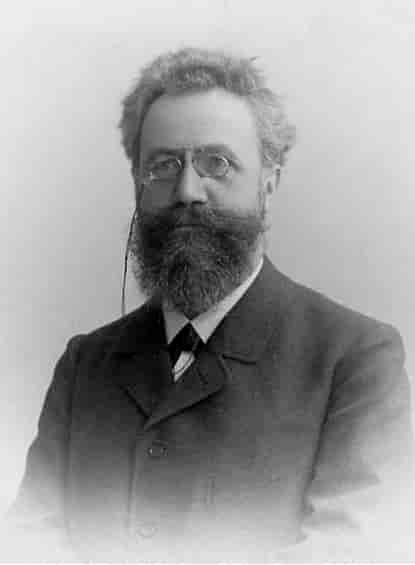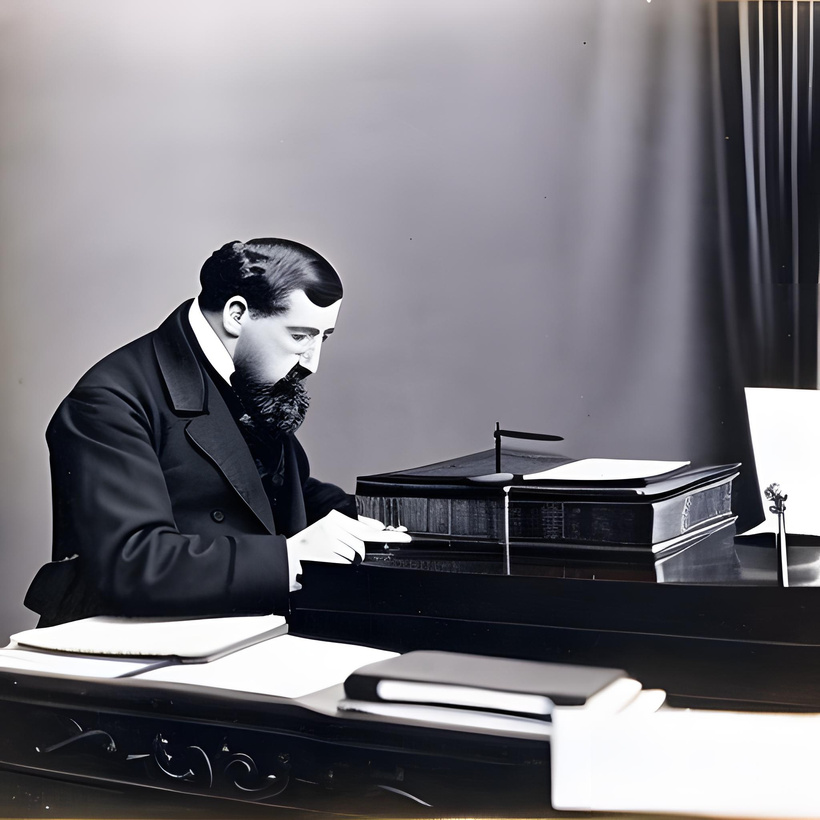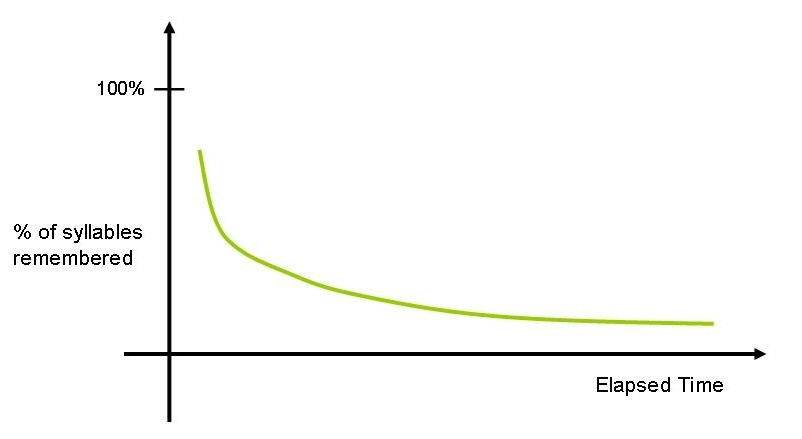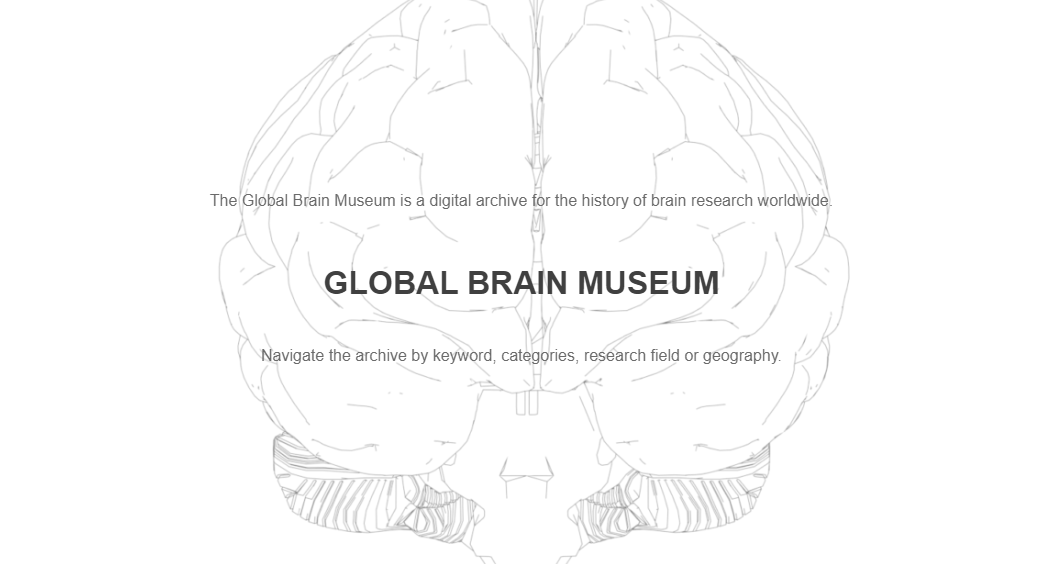
Hermann Ebbinghaus
The Online Museum on Forgetting
Scroll Down to Start

Biography
Hermann Ebbinghaus (1850-1909) was a German psychologist who made significant contributions to the field of psychology, particularly in the areas of memory and learning. Ebbinghaus was born in Barmen, Germany, on January 24, 1850. He grew up in a family of merchants and initially studied philosophy at the University of Bonn. However, he later turned his attention to psychology and became one of the first psychologists to conduct systematic experiments in the field.
Ebbinghaus is best known for his work on memory and learning. He conducted experiments on himself to study the nature of memory and developed a model of memory that is still widely used today. His research also laid the foundation for the study of human learning and memory, which is a critical area of research in psychology.

Ebbinghaus spent most of his academic career at the University of Berlin, where he became a professor of philosophy and psychology in 1894. He was a prolific writer and published numerous articles and books on psychology, including his seminal work, "Memory: A Contribution to Experimental Psychology."
Ebbinghaus was married to his wife, Lily, for over 30 years and had three children. He died on February 26, 1909, in Breslau, Germany, at the age of 59.
Ebbinghaus' legacy continues to be felt in the field of psychology today. His work on memory and learning has had a significant impact on the development of cognitive psychology and continues to influence research in the field.
The Science of Forgetting
The Psychological Science of 19th century

The 19th century saw the emergence of psychological science, which initially focused on the basic elements of consciousness. This approach, known as structuralism, aimed to identify the fundamental components of human experience through introspection. Structuralists sought to break down consciousness into its constituent parts, such as sensations and feelings. This emphasis on basic elements of consciousness marked the early years of psychology and set the stage for later theoretical and empirical advances. However, this approach was criticized for its limited scope and lack of practical applications, leading to the rise of more holistic perspectives and a growing emphasis on empirical methods.
The growing emphasis on empirical methods in psychology has been a hallmark of the discipline in recent decades. Empirical methods involve the use of experimental designs, quantitative techniques, and statistical analyses to test hypotheses and gather data. This approach has led to significant advances in our understanding of human behavior and mental processes, as well as a greater appreciation for the importance of evidence-based practice. However, despite these advances, there is still a limited understanding of the brain's function in mental processes. Ongoing research seeks to elucidate the neural mechanisms underlying cognitive and emotional processes, paving the way for new insights and potential interventions in the future.
The Science of Forgetting
A Simple Model, a Simple Measure

- Hermann Ebbinghaus pioneered the science of forgetting in the late 19th century, using a novel approach that laid the foundation for modern memory research. Ebbinghaus employed nonsense syllables, such as "WID" and "ZOF," to control for pre-existing associations in his study participants. He also used repeated learning and testing to track retention over time, calculating a savings score to quantify the amount of information retained. Additionally, Ebbinghaus systematically manipulated variables such as the length, spacing, and difficulty of the lists to determine their effects on memory. This quantitative approach involved statistical analysis of the data, marking a significant departure from earlier, more subjective methods of inquiry.
- Ebbinghaus's research on forgetting not only established the scientific study of memory but also had practical implications for education and training. His findings showed that the most effective learning occurs through spaced repetition, rather than massed practice, and that the rate of forgetting slows over time. These insights have since been corroborated by subsequent research, leading to the development of effective memory-enhancement techniques. Ebbinghaus's legacy thus endures, as his pioneering work continues to inform contemporary memory research and its applications in fields such as education, medicine, and technology.
The Science of Forgetting
Findings as Insightful Data

Forgetting curve: Ebbinghaus' forgetting curve describes how the amount of information retained decreases over time, with the steepest drop occurring immediately after learning.
Rapid forgetting: Ebbinghaus' research demonstrated that most forgetting occurs quickly after initial learning, and then tapers off over time. This finding highlights the importance of reviewing material soon after initial learning to consolidate it in long-term memory.
Relearning improves retention: Ebbinghaus found that relearning previously studied material helps to improve retention, as it reinforces connections between neurons in the brain.
Spacing effect: Ebbinghaus' research showed that spacing out study sessions over time, rather than cramming, improves long-term memory retention. This is known as the "spacing effect."
Learning time: Ebbinghaus also found that longer learning sessions generally improve retention, likely because they allow for more repetition and elaboration of the material.
Original Image from Wikimedia.org
The Science of Forgetting
Findings as Insightful Data

Meaningful material retained better: Ebbinghaus' work also suggested that information that is personally meaningful or relevant to an individual is more likely to be retained in long-term memory.
Overlearning: Continuing to study beyond the point of mastery, known as overlearning, can help to strengthen memories and improve retention, according to Ebbinghaus' research.
Mental associations improve retention: Ebbinghaus also emphasized the importance of creating mental associations between new information and existing knowledge, as this can help to improve retention by facilitating recall.
Memory distinct from sensation and perception: Through his research, Ebbinghaus demonstrated that memory is a distinct cognitive process from sensation and perception, which was an important step in establishing memory research as a scientific discipline.
Quantification of memory: Ebbinghaus' emphasis on using empirical methods and quantitative analysis to study memory helped to establish a scientific study of memory, and paved the way for future research in this field.
Original Image from Wikimedia.org
The Legacy
Hermann Ebbinghaus' groundbreaking research on memory and forgetting continues to inform current scientific understanding of memory processes. His methods, such as the "forgetting curve" and the study of repetition, have been adapted for use in modern research, and his legacy will continue to shape future studies of memory and learning.


References
Primary Sources
Secondary Sources
Ebbinghaus, H. (1885). Über das Gedächtnis: Untersuchungen zur experimentellen Psychologie [On Memory: Investigations in Experimental Psychology]. Duncker & Humblot.
Ebbinghaus, H. (1897). Grundzüge der Psychologie [Outlines of Psychology]. Veit & Comp.
Ebbinghaus, H. (1908). Psychologie [Psychology]. Verlag von Veit & Comp.
Ebbinghaus, H. (1913). Memory: A Contribution to Experimental Psychology. Teachers College, Columbia University.
Ebbinghaus, H. (1964). On Memory and Forgetting. Dover Publications.
Benjamin, L. T. (1997). A History of Psychology: Original Sources and Contemporary Research. McGraw-Hill.
Boring, E. G. (1929). A history of experimental psychology. Appleton-Century.
Colvin, M. K. (1993). Cognitive Psychology: An Overview for Cognitive Scientists. Lawrence Erlbaum Associates.
Fancher, R. E. (1990). Pioneers of Psychology (3rd ed.). New York: Norton.
Kimble, G. A., & Perlmuter, L. C. (1970). Readings in the Psychology of Learning. Appleton-Century-Crofts.
Roediger, H. L. (1980). Memory research in the 20th century: A tribute to Hermann Ebbinghaus. American Psychologist, 35(9), 805-812.
Wozniak, R. H. (1999). Hermann Ebbinghaus (1850–1909). In M. A. Runco & S. R. Pritzker (Eds.), Encyclopedia of Creativity (Vol. 1, pp. 585-590). Academic Press.
The Global Brain Museum
FENS stands for the Federation of European Neuroscience Societies. It is a non-profit organization that represents and promotes neuroscience research in Europe. FENS supports scientific meetings, workshops, and training programs, and also provides a platform for communication and collaboration among neuroscientists in Europe and beyond.
The FENS' Brain Online Museum feature exhibits on brain sciences, neuroscience research, and the history of neuroscience, among other topics. It aims to create a virtual museum dedicated to the brain and also provide a platform for sharing neuroscience-related educational resources and promoting public understanding of neuroscience. This project on Ebbinghaus is funded and supported by FENS History of Neuroscience Online Award, 2019.
You can visit the Museum by clicking here.


Thank You
for visiting us.
Follow us and share the content at your Social Networks
Created by Luiz Henrique Santana, Ph.D. and Marcelo Costa, Ph.D.